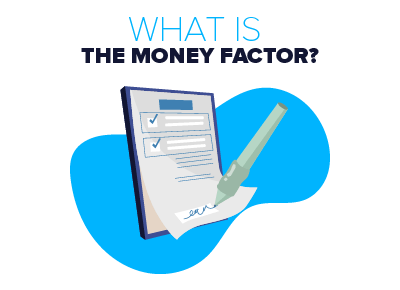Money Factor: What Is It, How To Calculate, How Its Used [+ Calculator]
April 12, 2021
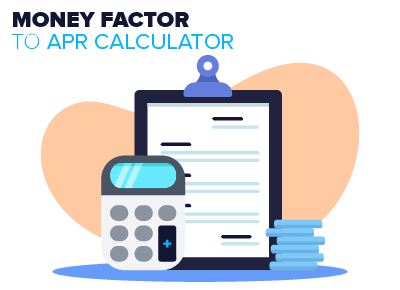

I am a serial entrepreneur and a consumer advocate. When I’m not helping car buyers, I love working on ventures that have a positive impact.
I run a cause marketing agency and serve on the board of Vayu Global Health where we are disrupting the medical industry and preventing the needless deaths of mothers and babies during childbirth.
When leasing a new car, you may run into a tiny decimal number, but what does it actually mean, and how does it impact your monthly payments?
One important but often overlooked term to know for leasing a vehicle is the money factor.
Here’s everything you need to know about the money factor and how to calculate it.
Table of Contents
Money Factor to APR Calculator
Easily convert a money factor to APR (interest rate) or vice versa using this calculator.
Money Factor Explained Video
What is the Money Factor?
The money factor indicates the interest you will pay on a lease, and it can be converted into an annual percentage rate for a better understanding. It is used to determine the finance fees on a lease with monthly payments.
The money factor is also called the “lease fee” or “lease factor”, and it is based on the customer’s credit score.
How is the Money Factor Used?
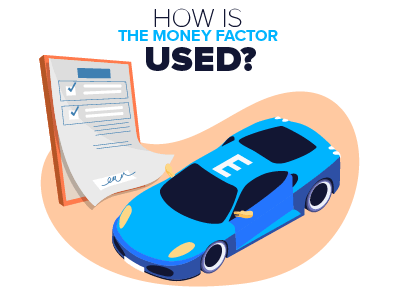
When a person leases a car, they must pay for the vehicle’s depreciation during the lease term. Monthly lease payments are comprised of taxes, interest, and depreciation.
The money factor is used to determine the interest portion of the monthly lease payments. While this is similar to the interest paid on a loan, it’s expressed differently. APR for a loan is expressed as a percentage, but the money factor is expressed as a decimal.
How to Calculate Lease Money Factor
To calculate the money factor, use this formula: Money Factor = Lease Charge / (Capitalized Cost * Residual Value) * Lease Term.
It's important to note that the customer’s credit score determines the money factor. The higher your credit score is, the lower the money factor on the lease will be.
One way to calculate the money factor is by converting it to an APR. To do this, you multiply the money factor by 2,400. If a car dealer provides you with an interest rate, divide it by 2,400 to find the money factor.
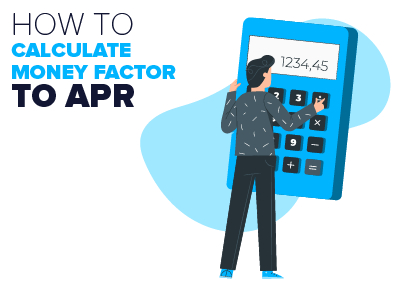
For example, if you are quoted a money factor of .003 on a loan, that would be (2,400x.003) 7.2%. If the car dealer quotes you an interest rate of 4.2%, you can divide it by 2,400 to find the money factor of .00175.
The money factor may be shown in an easier-to-read format, like 1.75 instead of .00175. This can often confuse customers because it appears to be a low interest rate. But don’t be fooled by a money factor presented as a factor of 1,000. Always be sure to ask if the number you are given is the APR or the money factor. If it’s the money factor, convert it to APR so that you can clearly see the interest rate.
Another way to calculate the money factor is with the lease charge. If the dealer provides you with a lease charge, you can use the formula below to calculate the money factor.
Money Factor = Lease Charge / (CC+RV) * LT
- Lease Charge: This is the total of monthly finance fees for the entire lease term.
- CC: This is the capitalized cost, or what you agree to pay for the vehicle.
- RV: This is the residual value, or what the car is worth at the end of the lease.
- LT: This is the lease term, expressed in months.
Money Factor to APR Example
Let’s say the car has a price of $37,500. The customer and dealer agree on a price of $34,000 for the leased car. The car lease term is three years, or 36 months, with an estimated residual value of $21,00. The total monthly fees are $5,500.
Money factor = $5,500 / ($34,000+$21,000) x 36 months
Money factor = $5,500 / $1,980,000
Money factor = .00278
Multiply the money value of .00278 x 2,400, and you’ll find an APR of 6.67%.
Can I Negotiate the Money Factor?
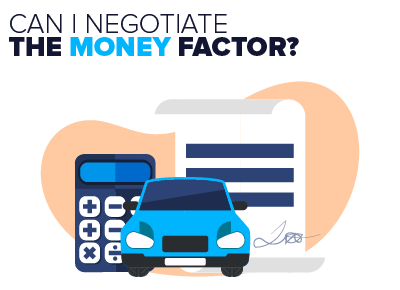 Your money factor will impact how much you pay each month. You should have a money factor that’s comparable or even lower than the interest on a new vehicle loan.
Your money factor will impact how much you pay each month. You should have a money factor that’s comparable or even lower than the interest on a new vehicle loan.
Always ask about the money factor for a lease. Many dealers do not bring up the money factor, and customers may not know how to ask. Oftentimes, the money factor isn’t disclosed in lease contracts, as it’s not required by law like an APR interest rate for a loan contract. Inquire in advance what money factor will be used to calculate your lease.
Once you find out the money factor, you may calculate the APR and realize your money factor is quite high. However, the money factor is based on your credit score. The better your credit score, the lower the money factor will be. Because of this, dealers will be strict about the money factor and not be willing to negotiate much. Rather than negotiate the money factor, focus on negotiating the total price of the car.
Frequently Asked Questions
What is a money factor?
The money factor is the finance rate for a car lease. It’s similar to the interest on a loan but expressed as a decimal. The higher your money factor is, the more you will pay in finance fees during your lease.
How is the money factor calculated?
The customer’s credit score determines the money factor. You can use the lease charge to calculate the money factor with this formula: Money Factor = Lease Charge / (Capitalized Cost * Residual Value) * Lease Term. Once you have the money factor, you can multiply it by 2,400 to convert it to an interest rate.
Is the money factor negotiable?
The money factor is based on your credit score and most often not negotiable. You should still ask for the money factor from the dealer. If the money factor is very high, consider working on your credit before signing a car lease. In terms of negotiation, focus on negotiating the capitalized cost of the vehicle.
What is a good money factor?
Credit determines the money factor. To find the average money factor, we can examine the national average for APR rates and then convert them. The national average APR for a car loan for someone with excellent credit is 4.96%, which would be a money factor of .002. However, the APR for someone with bad credit is 18.21% or a money factor of .0076.
Why is the money factor important?
The lower your money factor, the lower your monthly car payments. Understanding the money factor will help you know if you are getting a fair rate compared to national new-car loan interest rates. However, keep in mind that the money factor is only a portion of your monthly payment and that a far bigger chunk is based on the car’s capitalized cost and residual value at the end of the lease.
Posted in Car Buying Tips, Car Calculators |

